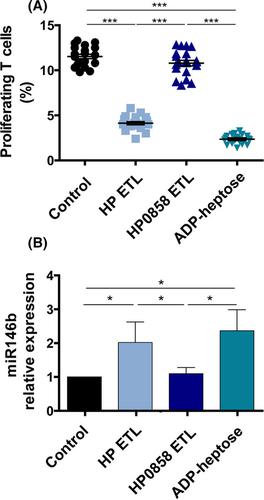当前位置:
X-MOL 学术
›
FEBS Lett.
›
论文详情
Our official English website, www.x-mol.net, welcomes your feedback! (Note: you will need to create a separate account there.)
ADP-heptose enables Helicobacter pylori to exploit macrophages as a survival niche by suppressing antigen-presenting HLA-II expression
FEBS Letters ( IF 3.5 ) Pub Date : 2021-07-03 , DOI: 10.1002/1873-3468.14156 Sara Coletta 1 , Greta Battaggia 1 , Chiara Della Bella 2 , Matteo Furlani 1 , Martina Hauke 3 , Larissa Faass 3 , Mario M D'Elios 2 , Christine Josenhans 3 , Marina de Bernard 1
FEBS Letters ( IF 3.5 ) Pub Date : 2021-07-03 , DOI: 10.1002/1873-3468.14156 Sara Coletta 1 , Greta Battaggia 1 , Chiara Della Bella 2 , Matteo Furlani 1 , Martina Hauke 3 , Larissa Faass 3 , Mario M D'Elios 2 , Christine Josenhans 3 , Marina de Bernard 1
Affiliation

|
The persistence of Helicobacter pylori in the human gastric mucosa implies that the immune response fails to clear the infection. We found that H. pylori compromises the antigen presentation ability of macrophages, because of the decline of the presenting molecules HLA-II. Here, we reveal that the main bacterial factor responsible for this effect is ADP-heptose, an intermediate metabolite in the biosynthetic pathway of lipopolysaccharide (LPS) that elicits a pro-inflammatory response in gastric epithelial cells. In macrophages, it upregulates the expression of miR146b which, in turn, would downmodulate CIITA, the master regulator for HLA-II genes. Hence, H. pylori, utilizing ADP-heptose, exploits a specific arm of macrophage response to establish its survival niche in the face of the immune defense elicited in the gastric mucosa.
中文翻译:

ADP-庚糖通过抑制抗原呈递 HLA-II 的表达,使幽门螺杆菌能够利用巨噬细胞作为生存环境
幽门螺杆菌在人胃粘膜中的持续存在意味着免疫反应未能清除感染。我们发现幽门螺杆菌损害巨噬细胞的抗原呈递能力,因为呈递分子 HLA-II 的下降。在这里,我们揭示了导致这种效应的主要细菌因子是 ADP-庚糖,这是脂多糖 (LPS) 生物合成途径中的一种中间代谢物,可在胃上皮细胞中引发促炎反应。在巨噬细胞中,它上调 miR146b 的表达,进而下调 HLA-II 基因的主要调节因子 CIITA。因此,幽门螺杆菌,利用 ADP-庚糖,利用巨噬细胞反应的特定臂来建立其面对胃粘膜引起的免疫防御的生存利基。
更新日期:2021-08-23
中文翻译:

ADP-庚糖通过抑制抗原呈递 HLA-II 的表达,使幽门螺杆菌能够利用巨噬细胞作为生存环境
幽门螺杆菌在人胃粘膜中的持续存在意味着免疫反应未能清除感染。我们发现幽门螺杆菌损害巨噬细胞的抗原呈递能力,因为呈递分子 HLA-II 的下降。在这里,我们揭示了导致这种效应的主要细菌因子是 ADP-庚糖,这是脂多糖 (LPS) 生物合成途径中的一种中间代谢物,可在胃上皮细胞中引发促炎反应。在巨噬细胞中,它上调 miR146b 的表达,进而下调 HLA-II 基因的主要调节因子 CIITA。因此,幽门螺杆菌,利用 ADP-庚糖,利用巨噬细胞反应的特定臂来建立其面对胃粘膜引起的免疫防御的生存利基。


























 京公网安备 11010802027423号
京公网安备 11010802027423号